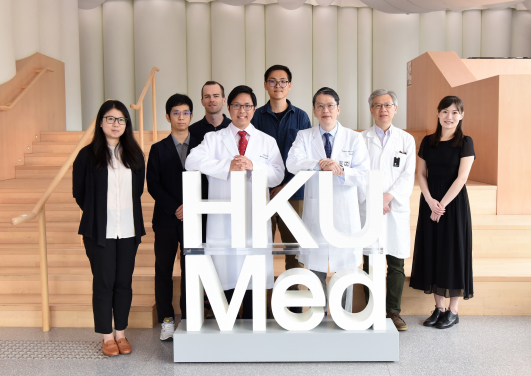Media
HKUMed finds global prevalence of H. pylori infection steadily
declining over 40 years
Combination of antibiotics in treating H. pylori could alter the virus community in the gut
24 Apr 2023

A research team from HKUMed finds global prevalence of H. pylori infection steadily declining over 40 years and combination of antibiotics in treating H. pylori could alter the virus community in the gut. The research team members include: (from left) Dr Kathy Leung Sze-man, Dr Horace Choi Cheuk-wai, Dr Daniel Morgan, Dr Joshua Ho Wing-kei, Li Yunhao, Professor Leung Wai-keung, Lau Kam-shing and Jiang Fang.
A research team led by Professor Leung Wai-keung from Department of Medicine, School of Clinical Medicine, LKS Faculty of Medicine, the University of Hong Kong (HKUMed) and the Baylor College of Medicine of the United States found that Helicobacter pylori (H. pylori) infection around the world has been steadily declining over the past four decades, thus offering a comprehensive, updated epidemiology of H. pylori infection. The study has been published in The Lancet Gastroenterology & Hepatology [link to publication].
In a separate study on the combination of antibiotics and acid suppressive therapies, Professor Leung’s research team discovered that the use of antibiotics could alter the micro-organisms and the virus community (virome) present in the gut. The findings have been published in the Nature Communications [link to publication].
Research background and findings
Helicobacter pylori (H. pylori) is the major cause of gastric cancer as well as peptic ulcer disease. It was previously estimated that about 50% of the world’s population are being infected with this bacterium, particularly in Asia including China. HKUMed and the Baylor College of Medicine of the United States provided a systematic review and meta-analysis on epidemiology of H. pylori infection in the world over the past four decades, which included 224 studies from 71 countries. The study found that the global prevalence of H. pylori infection has been declining from 58.2% in the decade of 1980-1990 to 43.1% in the period of 2011-2022. On average, there was a decline of about 0.39-0.83% per year in the prevalence of H. pylori infection in the world. The decline is particularly marked in the last decade (2010-2020), and is evidenced in all six World Health Organization (WHO) regions (Africa, the Americas, Europe, Eastern Mediterranean, South-East Asia and Western Pacific), or according to the World Bank income or the WHO universal health coverage level of the country or region. Our latest estimation shows that more than 40% of the adult population in the world is still infected with H. pylori, this could still pose a major burden on the health care system, especially on the morbidity and mortality related to peptic ulcer disease and gastric cancer.
Eradication of H. pylori by combination of antibiotics and acid suppressive therapies could substantially reduce the risk of subsequent gastric cancer development as well as ulcer complications. However, the use of antibiotics could also accidentally alter the micro-organisms present in the gut (or gut microbiome). Professor Leung’s research team showed that not only the gut bacteria could be inadvertently altered by antibiotics used in H. pylori eradication, but the virus community (virome) present in the gut could also be reshaped. With the use of metagenomic sequencing techniques, they found a contraction of virome diversity after treatment for H. pylori. Unlike changes in gut bacteria composition which can typically restored at six months, the contraction in the virus community persists for more than six months. Multiple courses of antibiotic treatments further lower the virus community diversity.
Research significance
Professor Leung Wai-keung, Li Shu Fan Medical Foundation Professor in Gastroenterology, Clinical Professor, Department of Medicine, School of Clinical Medicine, HKUMed, commented, ’Despite a considerable fall in the overall prevalence of H. pylori in the world over the past 40 years, the burden of this infection in some regions is still high, particularly when considering this is a cancer-causing agent. Our results could help to inform planning for stomach cancer prevention in different regions and reiterate the importance of continuous monitoring of latest infection status.’
Professor Leung further commented, ‘The second study highlighted the potential impact of antibiotics treatment on the alteration of virus community of the gut, which could impact individual’s health as well as antibiotics resistance through modification of the bacteriophages present in gut.’
About the research team
The research was led by Professor Leung Wai-keung, Li Shu Fan Medical Foundation Professor in Gastroenterology, Clinical Professor, Department of Medicine, School of Clinical Medicine, HKUMed. Members of research team for study of global prevalence of Helicobacter pylori are Li Yunhao and Jiang Fang, PhD students, Department of Medicine, School of Clinical Medicine, HKUMed; Dr Horace Choi Cheuk-wai, Assistant Professor (Research), and Dr Kathy Leung Sze-man, Assistant Professor, School of Public Health, HKUMed. For the study of combination of antibiotics, research team members are Wang Lingling, former PhD student, Department of Medicine, School of Clinical Medicine, HKUMed; Dr Daniel Morgan, Postdoctoral Fellow, School of Biomedical Sciences, HKUMed; Lau Kam-shing, Senior Technician, Department of Medicine, School of Clinical Medicine, HKUMed; Dr Joshua Ho Wing-kei, Associate Professor, School of Biomedical Sciences, HKUMed; and Professor Leung Suet-yi, Director, Jockey Club Centre for Clinical Innovation and Discovery, HKU.
Media enquiries
Please contact LKS Faculty of Medicine of The University of Hong Kong by email (medmedia@hku.hk).
